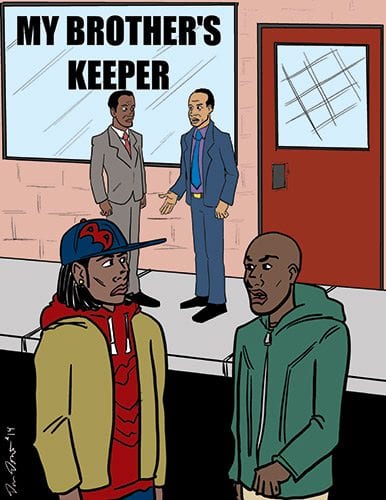
Some problems are so huge that they seem to be unsolvable. The dire statistics of the plight of urban black boys indicate that a lost generation is inevitable. But President Obama is not giving up. He has recently announced “My Brother’s Keeper,” a major national initiative to turn the tide. Obama has called on foundations, corporations, business leaders and entrepreneurs to develop strategies to rescue black youth from failure.
Remedial programs will be less effective if flaws in the culture are not repaired. Over the decades it has become more acceptable to have children out of wedlock. In 1940, only 16.8 percent of blacks were born out of wedlock. By 1963, that number had grown to 23.6 percent, and by 2012, the rate had become 72.2 percent. This is less a moral concern than a failure to create an effective entity for raising children.
If a boat is filling with water it makes good sense to bail to prevent it from sinking. However, the real solution is to repair the hole in the hull. Similarly, African Americans must analyze their culture to determine what improvements might be helpful. Perhaps it is time to revive the old African idea that “it takes a whole village to raise a child.” With all of the demands of modern life the more isolated parent-centric structure does not always work well.
Another concept to be resurrected is a greater respect for elders. American society changes so fast that teenagers often look upon those only in their 30s as mere fossils. The problem with this attitude is that the adults might also find the teen sub-culture to be unpleasantly crass and disrespectful. That would create an impediment for a constructive teacher-student type relationship.
Young boys, infused with an abundance of testosterone, are driven by a will to win. It is up to the standards of the culture to define winning and losing. That is not an easy task because while academic success is clearly winning, the process of attaining academic achievement is so challenging and sometimes deflating, it hardly satisfies the male fantasies of heroic victories.
One way to redefine success is to create role models who are not athletes or rap stars. But more importantly, students should be made to understand that academic achievers are to be respected for raising the profile of the race. They are more significant than someone whose only accomplishment is slam-dunking a basketball.
The media will ultimately have considerable influence in determining the image of young blacks. Are they essentially gangbangers or are they young men with much to offer society if they are properly prepared for the task? The emphasis in the press will help to generate self-confidence in the community or create an image of young thugs to outsiders.
Obama’s message is clear. He is asking Americans to provide the resources the black youth need to develop, but it is ultimately up to the individual to take advantage of the opportunities. As the president has said, there are “no excuses.” Many of the “Brother’s Keepers” involved in the program will be volunteers. They are unlikely to be willing to continue to give their time if the youth do not make a colossal effort to succeed. Indeed there can be “no excuses.”






